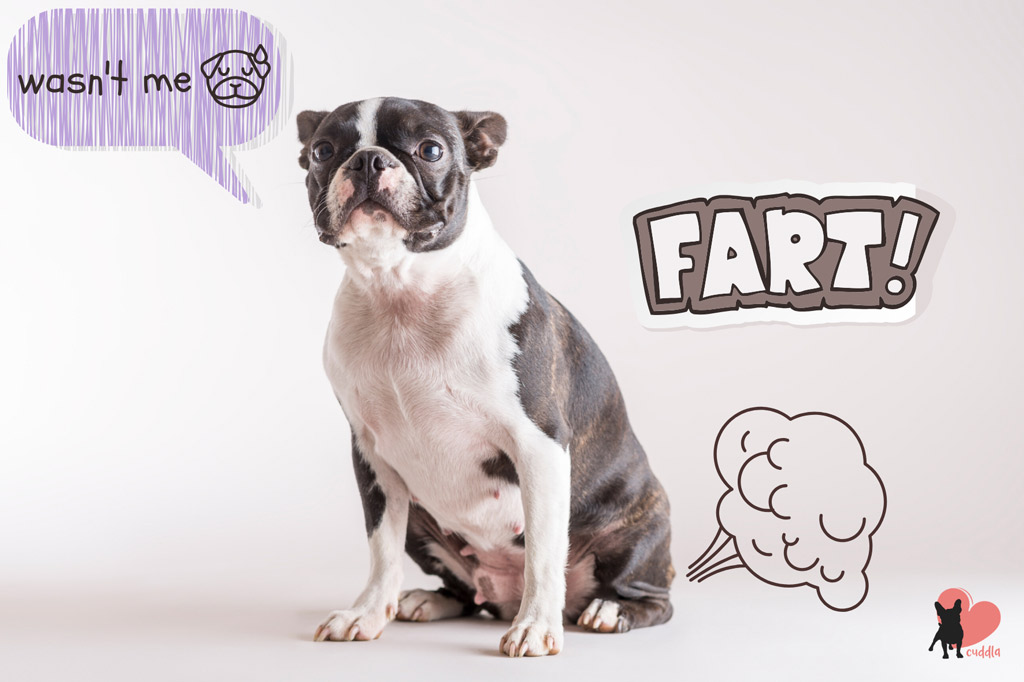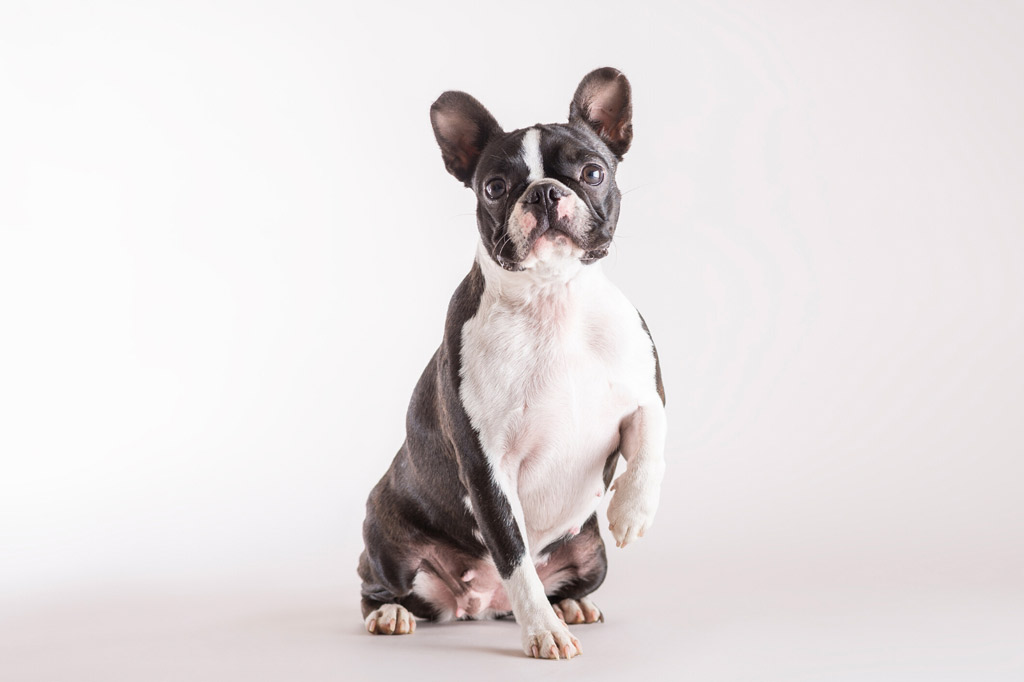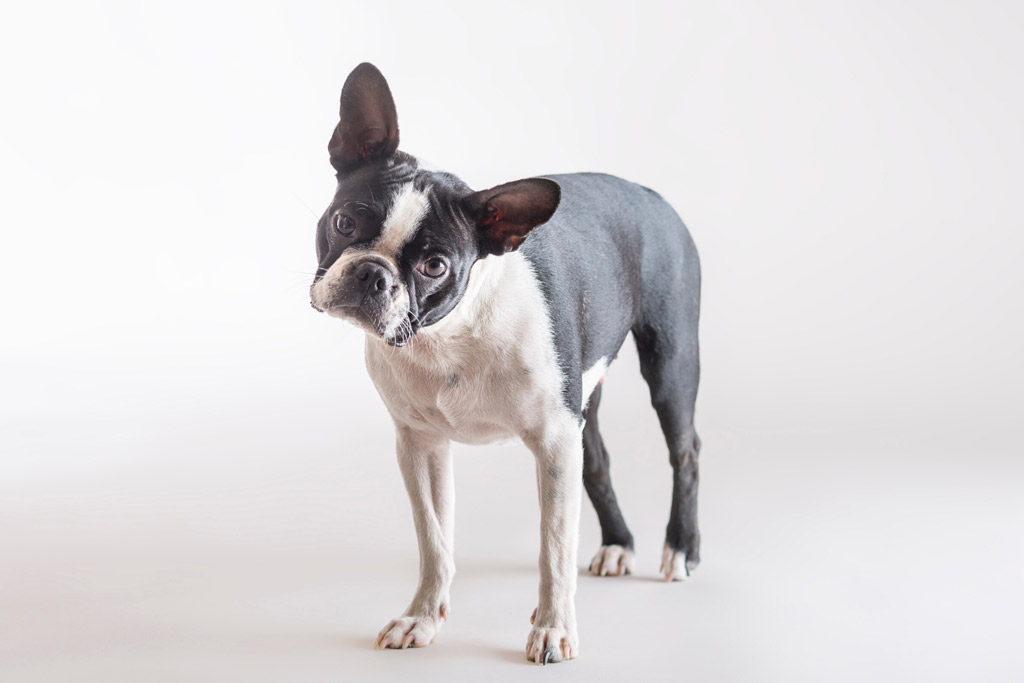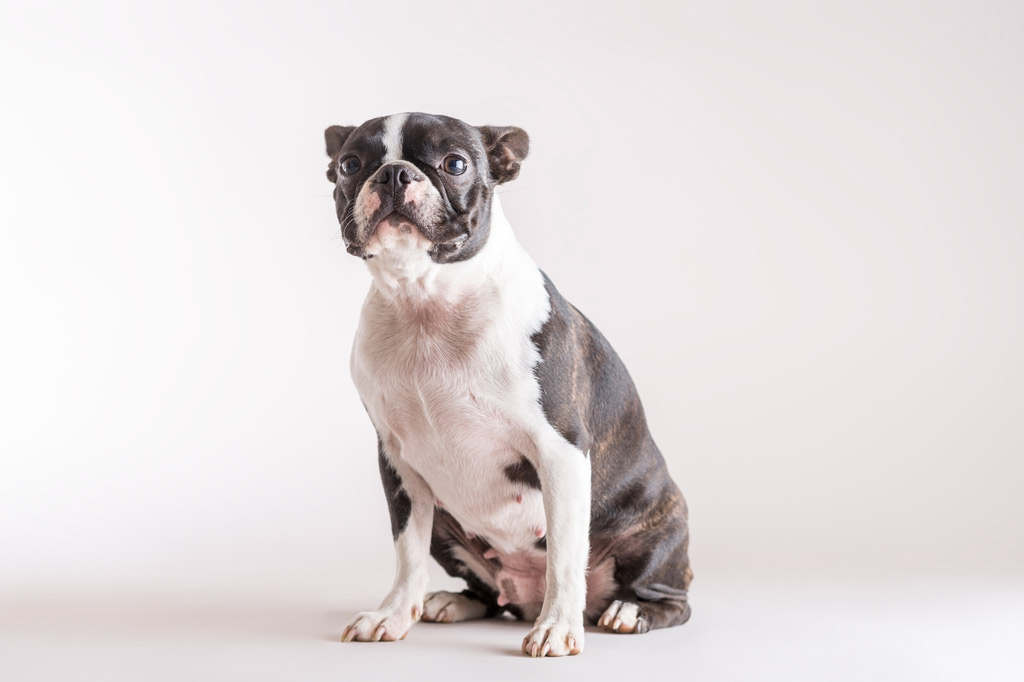
Do you run away from your dog every time she farts?
Sounds funny, but it’s not. There’s no way to handle those smelly gas bombs! Every time our pooch used to fart, we had to evacuate our living room!
Plus, it can get pretty embarrassing when you have guests and your dog decides to release either a “silent but deadly” or “startlingly loud and smelly” fart.
Boston Terriers are gassy, which is one part of the breed’s traits. 😉 But while the occasional gaseous emissions are a normal and unavoidable part of life, excessive flatulence is not.
Let’s see what causes Boston Terriers to be so gassy and how to stop them from farting too much.
Are Boston Terriers Gassy?
Webmd explains that flatulence occurs when gas accumulates in your dog’s intestinal tract and colon. This is a natural reaction of the body that occurs when bacteria break down certain types of food.
Although flatulence is a normal response of a dog’s body when digesting certain foods, some dogs are more prone to gassiness than others.
So, are Boston Terriers gassy? Yes, they are! Boston Terriers are gassy and they are famous for their flatulence!
Let me tell you why.
Flatulence in Boston Terriers
According to the AKC, dogs can be gassier if they tend to swallow a lot of air when they eat and drink. Like the gas formed in their digestive tract, this swallowed air is also expelled by farting.
This is especially the case for speed-eaters and short-nosed brachycephalic breeds including Boston Terriers, Pugs, Bulldogs and Boxers.
That’s why Boston Terriers’ gassiness can be a byproduct of those flat snouts that causes them to swallow a lot of air. But, Boston Terrier’s flatulence can also be the result of eating too fast, and their diet too.
Why Do Boston Terriers Fart So Much?
Do Boston Terriers fart a lot?
They can fart more than other dog breeds due to their snouts but it shouldn’t be excessive. If you feel like you need to wear a gas mask around your Boston Terrier, then something is not right.
So, why do they fart so much?
The main causes of excessive flatulence in Boston Terriers are:
- Diet.
- Low-quality foods with ingredients (fillers and artificial preservatives) that can’t be fully digested can cause gas.
- Table scraps.
- Foods containing lactose.
- Indigestible carbohydrates, especially soluble and fermentable fibre.
- Grains, corn, soy, potatoes, rice, legumes, beans, etc.
- Speed eating.
- Other health problems.
Flatulence in dogs, like in humans, is related to what food they consume.
If your Boston Terrier is gassy after eating, it’s highly likely that her diet has a negative impact on her digestion.
Personally, I have noticed my dogs becoming more or less gassy depending on what they eat.
“The most common cause of flatulence is a change in diet or from the dog eating something spoiled (dietary indiscretion).”
Ernest Ward, DVM.
Don’t despair, there’s something you can do, starting with her diet!

How to Stop Excessive Flatulence in Boston Terriers
Flatulence treatment commonly involves a change in diet. But before that, you might want to…
#1 – Rule Out a Gastrointestinal Problem
Certain gastrointestinal diseases can have flatulence as a symptom. These include:
- Canine colitis.
- Irritable bowel syndrome (IBS).
- Intestinal parasites.
- Inflammatory bowel disease.
- Cancer.
- Pancreatitis.
That’s why it’s so important to visit the vet to see why your Boston Terrier is farting all the time. Also, bear in mind that your pooch could be in pain from all that excess gas too.
#2 – Test For Food Intolerance or Allergies
Some breeds like Boston Terriers have a higher incidence of indigestion and digestive upset.
These issues are often linked to gluten sensitivities due to corn or soy. Flatulence is a common symptom in these cases.
Like I mentioned before, food intolerance can escalate a food allergy. So, if there are no other health concerns, you should test your doggie or try an elimination diet.
Read also: Boston Terrier Allergies – Causes, Symptoms and Treatments.
#3 – Change Your Boston Terrier’s Diet
First of all, here’s a disclaimer:

I am not a veterinarian, so always check with your vet to avoid unexpected consequences.
However, I do have knowledge on dog nutrition and first-hand experience with gassy dogs.
Changing your Boston Terrier’s diet is the next step, especially once you know what foods trigger her intolerance or allergic reaction (i.e., make her more gassy than usual).
However, it’s important to speak to your vet before changing your dog’s diet since individual health issues play a big role. The last thing you want is to aggravate any condition.
You want to gradually transition your pooch from her old food into the new diet, so you don’t further upset her stomach (causing more gas and diarrhoea).
Best Diet for Boston Terriers with Gas
Gassy Boston Terriers do better on a raw diet that is freshly prepared. For allergic dogs, you simply stay away from the food allergen.
Nutritionally speaking, the raw diet is the richest in nutrition and the diet that dogs have been eating for thousands of years.
It’s high in whole animal protein and low in fats, but with a balanced ration between Omega-3 and Omega-6.
Also, this type of diet stays away from unnecessary carbohydrates (corn, wheat, rice, and soy) but includes beneficial vegetables and fruits.
Read also: Raw Diet for Boston Terriers.
Continue reading for kibble options (#6 – Avoid Fart-Inducing Foods).
Best Kibble for Allergic Boston Terriers
If your Boston Terrier is intolerant or allergic to gluten (grains and rice) or a specific type of grain (corn), you can feed him a kibble diet corn-free, for instance.
Just look for foods labelled “gluten-free” or “grain-free.” Here’s a dog wholesome (whole prey) grain-free food selection.
Insiders Tip: If you are going through an elimination diet (1 protein source), your veterinarian might suggest limited ingredient, hypoallergenic or novel diets.
These should also be gluten-free, soy-free and corn-free. Also, make sure they don’t contain unnecessary artificial colours, flavours, and preservatives.
Here is a good variety of whole foods (whole prey) with limited ingredients:
- Natural Balance Limited Ingredient Dry Dog Food, grain-free: Bison and Sweet Potatoes or Venison and Sweet Potatoes.
- Blue Buffalo Limited Ingredient Diet, grain-free: Lamb and Potatoes or Salmon and Potatoes.
- Venison and Red Lentils by Purevita Grain-Free Venison Dog Food.
- Duck and Green Lentils by Purevita Grain-Free Duck Dog Food.
- Rabbit and Pumpkin by Earthborn Holistic Venture Grain-Free Dry Dog Food.
- Wild Boar and Butternut Squash by Earthborn Holistic Venture Grain-Free Dry Dog Food.
Read also: Best Diet for Boston Terriers with Sensitive Stomach.
#4 – Don’t Feed Table Scraps
Dogs metabolize foods differently from humans. That’s why it’s good to know which foods are safe for your Boston.
There are some human foods that are perfectly safe and even healthy for dogs to eat as an occasional treat. However, there are others that are harmful and even toxic for dogs!
Table scraps and human foods can give your pooch digestive issues including gas.
Read also: Can a Boston Terrier Eat Apples? 10 Other Safe Human Foods and Can a Boston Terrier Eat Grapes? And 10 Other Toxic Foods blog posts.

#5 – Keep Your Boston Terrier Out of the Trash
Dogs are beyond curious!
They are going to get in trouble, no matter what. But you can limit the amount of accidents, especially the dangerous ones!
During walks, keep your Boston Terrier away from anything suspicious on the ground (from trash to food). Tilly, a terrier that I fostered, was a specialist in finding and chewing all kinds of stuff during walks! My eyes never left the floor! This is when the leave-it command comes in handy.
At home, you can keep your Boston Terrier safe by establishing a dog safe zone and dog-proofing your home.
Here are some solutions to prevent your curious furry friend getting in trouble:
- Dog-proof bin to keep your dog out of the trash.
- Toilet-bowl lid latches (never had to use these as I always keep the bathroom door closed, but some dogs know how to open doors!)
- A dog food bin to store kibble, some get crafty when there’s food involved!
- Baby or pet gates to limit space.
- A foldable playpen to keep him out of trouble when alone.
P.S. For some ideas, have a look at dog beds and other basic needs at my Dog Safe Zone Kit list on Amazon.
#6 – Avoid Fart-Inducing Foods
Regardless of the type of food you feed your Boston Terrier, you want to stay away from these ingredients:
- Soy.
- Corn.
- Grains.
- Legumes: lentils, chickpeas and beans.
- Potatoes.
- Rice.
- Peas.
Also, even dog safe foods can lead to farting. Steamed vegetables that are sulfur-rich like cauliflower, broccoli, and especially brussels sprouts are healthy treats but too much of them could lead to smelly farts.
Remember that only 6% of your dog’s daily calories should come from carbohydrates, including healthy vegetables and fruits.
Best Kibble for Gassy Boston Terriers
When looking at kibble options, it can be difficult to avoid starches (potatoes and rice) or legumes.
However, I did find these options:
- Purina Beyond Natural Adult Dry Dog Food Superfoods Blend, which includes salmon (first ingredient), eggs and pumpkin.
- Earthborn Holistic Venture Grain-Free Dry Dog Food Rabbit and Pumpkin (95% protein, but it contains peas).
Read also: Best Diet for Boston Terriers with Sensitive Stomach.
#7 – Slow Down Speed Eaters
Some dogs take their time with their meal, others swallow whatever you give them.
Especially for dogs that may have experienced and suffered from malnourishment and food deprivation in the past, they will tend to eat quicker than dogs with no trauma. The main reason is the fear of not getting more food later on.
It broke my heart when Tilly (a tinny Jack Russel Terrier Cross I fostered) ate her food like there was no tomorrow.
But, during my early childhood, I also struggled with both my Boxer and Yorkie. They were also speed eaters and never got to understand why. Because of this, my boxer (also a brachycephalic breed) was a huge farty.
Remember that the swallowing of air plus the breed’s trait (brachycephalic) will cause more farting. On top of that, certain foods (like you have read) will make it worse.
Here are some things that I tried that might help you if your Boston Terrier eats too fast for her own good:
- Divide your Boston’s meals into several portions (i.e., don’t feed her all at once).
- Use a rubber dispenser toy like a Kong – this especially helped Tilly.
- A Lickimat Slow Feeder for smoothies, apple sauce and other pasty meals. Also helps to keep your pooch focused when you are grooming her! It’s a 2-in-1 for me!
- Raised slow feeder bowl (features a raised centre to make swallowing large amounts of food impossible for your dog) – helped Tootsie, the pug in my about profile photo. 🙂
#8 – Keep Your Boston Terrier Active
In addition to slowing down your Boston Terrier’s eating, keep your pooch active with regular exercise and playtime.
Exercise helps improve digestion and reduce flatulence. Plus, it keeps your Boston Terrier in her ideal weight. An overweight dog tends to be gassier than her slimmer counterparts.
Read also: How Much Exercise Do Boston Terriers Need? Age-Specific.
#9 – Medication and Supplements
Some veterinarians might recommend medication or supplements after ruling out medical or dietary causes of your pup’s excess gas.
Medication like simethicone or an antacid can help reduce gassiness. Also, supplementing your Boston Terrier’s diet with probiotics can help.
Finally, dog foods and treats that contain ingredients like Yucca Schidigera, activated charcoal (source) and zinc acetate (source) may help reduce the odour of your dog’s smelly farts.

